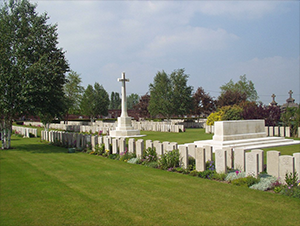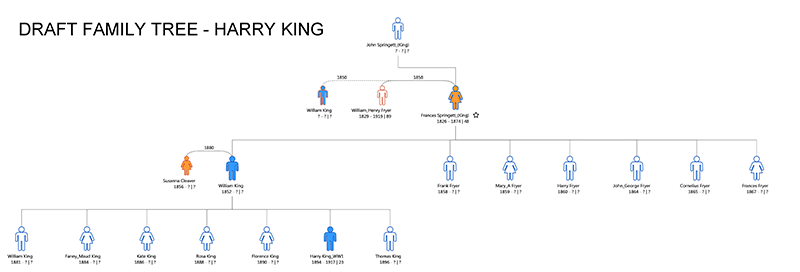First World War Project
Harry KING (of Doddington)
b. 1894 Corporal, Service Number 74569 |

Harry King is not formally memorialised in Doddington but his Commonwealth War Graves Commission (CWGC) registration describes him as "Son of William and Susanna King, of Rose Farm, Doddington, Sittingbourne. Native of Marden, Kent". The Doddington connection was established at some time between 1911 and August 1919 (when Harry's effects were made over to his mother). Rose Farm sits on Seed Road at the southern edge of Doddington Parish. The absence of surviving paperwork makes it difficult to be exact. While Harry's name is not recorded on the Marden War Memorial, he is inscribed on the Egerton War Memorial that sits in the churchyard of St James Church, The Street, Egerton, near Ashford. The Egerton inscription may reflect Harry's father's role as a Game Keeper living in "Dorne" Cottages, Egerton in 1911?
Harry's parents and grandparents had strong ties to the Ashford/Maidstone areas. His father, William, was born in East Farleigh and, as an adult, was employed as a Game Keeper in Marden, Egerton and, potentially, Rose Farm, Doddington. Harry's father was the only child of William (senior) after his father died within two years of marrying Frances Pringett who went on to marry William Henry Fryer.
The 1911 Census shows that Susanna gave birth to 10 children of which only 6 had survived. From Census data, we have identified 7 children but not which one died prematurely. Harry's known siblings were William (East Farleigh), Fanny Maud (Linton), Kate (Linton), Rosa (Linton), Florence (Linton), and Thomas (Marden). All these were in the area between Ashford and Maidstone.
His medal card records show that he first attested on 23rd August 1914 as a Gunner, before being made up to Corporal. His personal effects amounted to a substantial £51 16s. 9d; In addition, Harry's War Gratuity of £17 was approved on 24th October 1919. The gratuity amount confirms his enlistment month.
Harry's Effects amounted to £51 16s. 9d. and his mother, Susannah, also received his War Gratuity of £17. [See Appendix 2]
His medal record shows that, for long service, Harry King was awarded the 1914 Star (with clasp), Victory and British War Medals. [See Appendix 1]
Military Experience of Harry King
Tracking the experiences of those serving in the Royal Field Artillery after January 1917 is complicated by the general reorganisation of Divisional Artillery units into Army Brigades. Individual Batteries were sometimes split to enable the rebalancing of artillery support to Infantry Brigades. Often, the "tactical" direction of individual Batteries was transferred to neighbouring Commands for limited periods in support of Raids, attacks and "Chinese" attacks (heavy barrages laid down to draw German forces away from real troop attacks elsewhere along the Front).
We have transcribed and summarised diary entries in the period before Harry's death from poisonous gas to give an idea of what he and other in Artillery Batteries experienced day-to-day.
4th Army Field Artillery Diary, from January to May, 1917
January: Artillery Reorganisation: Replacing French Artillery Units: Bouchavensnes [Map: 62.c.NW2]
18th: First half Batteries 68th, 88th & A/14 marched into action [B.23.b.3.7]. Relieved French (Villier's Group) Batteries 4th, 5th and 6th.
19th: Second half Batteries marched into action B.23.b.3.7. Brigade HQ moved up.
20th: At 5am guns in position. At 8am, Relief completed. Wagon Lines L.17.a [Albert 1/40,000]
25th: 14th Brigade RFA attached to 33rd Division and form part of Left Group under Colonel Stewart, 156 Brigade. German aeroplane destroyed by British aeroplane over Marlieres Wood.
27th: Fired 101 rounds to commemorate Kaisers birthday. Corporal Farmer wounded whilst patrolling lines.
29th: German aeroplanes bombed waggon lines. 25 horses killed and 26 wounded, also 1 man wounded, all of 88th Battery.
March
1st: HOSPITAL WOOD [Bouchavesnes]. Wire cutting on Fritz & Pallas continued.
2nd: Wire cutting continued. Portions of Barrages for battle tested. Remaining Sections of A/14 arrived in position in B.7.a.
3rd: Barrages again tested.
4th: Attack made at 5.15am. The enterprise was successful, the infantry capturing PALLAS, PALLAS SUPPORT, and FRITZ. BREMENT & JUPITER trenches were also entered but not held. 3 officers & 300 wounded and unwounded prisoners were taken, and 3 machine guns. Our artillery barrage reported as exceptionally good and also the enemy wire was well destroyed. The Enemy launched no general attack; parties of Germans were seen coming up from MOISLAINS during the day. Several hostile batteries proved to be visible from FRITZ. The Enemy put down severe heavy retaliation. Severe bombing attack in FRITZ CUT during night, by Enemy.
5th: Captured ground kept under heavy fire during day.
6th: HOSPITAL WOOD: German Guns less active.
7th: Half 68th Battery relieved by 33rd Battery & proceeded to B.28.b, under 40th D.A.
A/14 marched out and went into old position B.23.a. Group rearranged.
127 Battery relieved by section of 33rd Battery. D/181 and 36th Battery into Group. 2/181 marched out.
8th: B/181 & D/178 left group. Relief of 68th Battery completed. A/156 & B/156 joined group. Colonel G Marryat arrived to command Brigade.
10th: Headquarters move out of action.
13th: Lt. J.B. Harold leaves Brigade to join R.F.C.
15th: Colonel Marryat returned from leave. Major C.G.A. Cooper rejoins 68th Battery.
17th: Half Batteries of 68th & 88th and whole of A/14 came out of action and return to Wagon Line. Lt. Burtsall joins Brigade Headquarters.
18th: Remaining half 68th and 88th Batteries came out of action and return to Waggon Lines.
20th-28th: [Brigade Relocated] Brigade marched to Camp 117 Bois de Tailles; then to Camon (Nr Amiens) via Corbie; then to Naours (via Amiens, Telmas); then to Boisbergues via Candas and Autheux; then to Fallievres via Trohen le Grand, Villisol l'Hopital, Boffles & Rougefay; then to Heuchin via Linzen; then to Calonne Perouart via Boyaval Pernes.
29th: Batteries marched to (68th & 88th) Fosse 10; A14 - Bois de Verdial; B.H.C. - Hesdigneul; HQ - Boyeffles.
Brigade came under orders (tactically) of 24th Division.
68th & 88th Batteries joined North Group under Col. Pretchells; 282nd Brigade R.F.A.; A/14 joined South Group under Col. Carridge, 127th Brigade R.F.A.
30th: 2/Lt Lister joined Brigade attached 88th Battery. 5 Guns, 88th Battery moved into position – R.35.c.2.7. [France Sheet 36B, 1/20,000]
31st: 88th Battery registered.
April - BOYEFFLES, LENS I.1
2nd: 68th Battery move into action. 1 Section R.35.d.2.8, 1 Section R.28.c.8.2, 1 Section R.34.a. [Sheet 36B]
A/14 Battery move into action. X.11.b.5.5
Brigade Headquarters remain at Boyeffles.
3rd: 2/Lt R.G. Peck, 68th Battery evacuated (sick)
4th: Col. R. Marryat left Brigade to command (temporarily) 108th Brigade R.F.A.
7th: Two men wounded 68th Battery.
9th: Attack made on Vimy Ridge by Canadian Corps. The three batteries 14th Brigade, took part in barrage in left flank of attack.
10th: Major A Dawson rejoined Brigade & took command of 88th Battery.
68th, 88th & A/14 took part in attack on Boisen Hache, S.2.b.
13th: Two rear sections of 68th Battery move to forward position R.35.d.2.8.
14th: Major C.G.A. Cooper took command of 14th Brigade whilst Lt. Col. Marryat commanded 108th Brigade.
15th: 68th and 88th Batteries each moved a section of guns into action at M.27.b.1.1 [France 36C, SW]
16th: 68th Battery moved 2 sections and 88th Battery moved 3 guns into action at M.27.b.1.1.
17th: A/14 Battery moved out of action
18th: A/14 Battery moved into action at M.9.b.4.5. Attached to Left Group, 24th D.A. under command of Lt. Col. Balston.
19th: A/14 Battery heavily bombarded by gas shells during the night.
20th: Boeffles: Lt. Col. R. Marryat returned to command 14th Brigade A.F.A.; 68th Battery joined Centre Group under command Lt.Col. Spiller.
23rd: All Batteries assisted in bombardment for attack made by 46th Division to take high ground M.24.d.
24th: 68th & 88th Batteries heavily shelled during the day. One gun (D Subsection), 88th Battery destroyed and ammunition dumps blown up. Sergeant F. Brooks 88th Battery awarded D.C.M. for gallantry under fire. Sergeant Harmer 88th Battery awarded Military Medal.
26th: 68th and 88th Batteries take over the positions of A & B 231 Brigade at M.22.a.31.10 & M.27.b.85.80 respectively.
28th: A/14 Battery position bombarded during the night by gas shells from 9pm to 11am next day.
29th: M.9.b.15.80: At 2pm Lt. Col. Marryat 14th Brigade A.F.A. took command of Left Group; 46th D.A. consisting of North Sub-Group commanded by Major Buxton joined with 4 Batteries 230th Brigade 46th Divisional Artillery and South Sub-Group commanded by Major C.G.A. Cooper with 3 Batteries 14th Brigade and howitzer Battery D.3.8. (6th Division).
30th: Lt.Col. R. Marryat wounded at Observing Station.
May
1st: 14th Brigade H.Q. moved to M.22.c.5.7. Left Group commanded by Major Buxton Smith. 14th Brigade & D38 (Howitzers) comprising South sub-group under command Major C.G.A. Cooper R.F.A.
2nd Lt Davis & 2nd Lt Charlesworth joined Brigade attached 88th & A/14 Batteries respectively.
2nd to 6th May: Nothing to report. Hostile Artillery occasionally active especially on counter Battery work.
7th: During night 7th/8th Lieven heavily bombarded by gas shell (estimated 3000 shells). 88th Battery suffered casualties. 1 Sergeant gassed and evacuated, 4 O.R. remained at duty. Subsequent information 1 sergeant, 1 bombardier, 2 gunners and 1 corporal died from gas poisoning.
8th: Nothing to report.
9th: Lt Col. E.E. St-John arrived and took command of 14th Brigade A.F.A. Headquarters moved back M.9.d.35.40. South sub-group remained as before.
Circumstances of the death of Harry King
Harry King died from gas poisoning when the 88th Battery received prolonged gas shelling near Liévin, west of Lens. He was buried about 22 kilometres north-west at Bethune where he succumbed to his injuries. Bethune was an important railway and hospital centre - 33rd Casualty Clearing Station.


 World War 1 Pages
World War 1 Pages